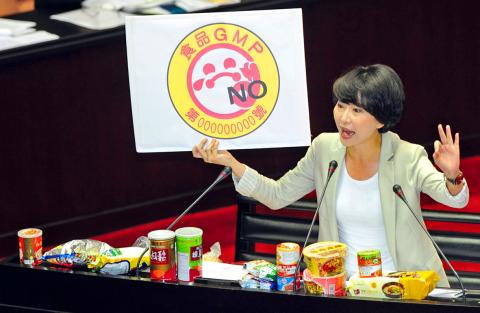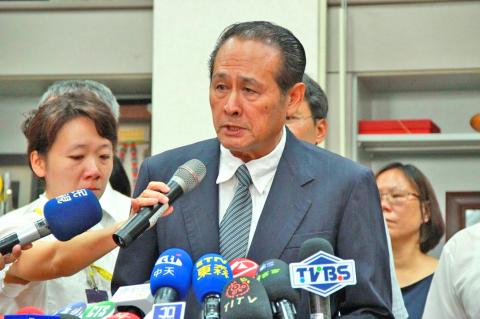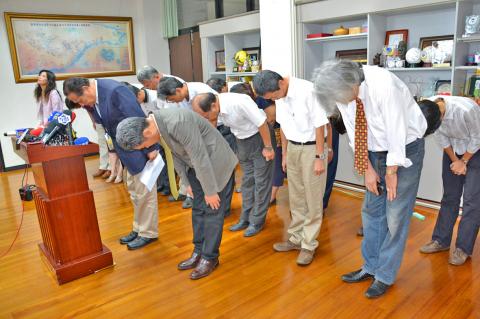The current administration should be pulled off the shelves along with other tainted products, Democratic Progressive Party (DPP) Legislator Chen Ting-fei (陳亭妃) said as Cabinet members came under a bipartisan barrage of questions and criticisms on the legislative floor yesterday.
The Cabinet is led by the same premier and has the same minister of health and welfare who called for the public to have faith in the Good Manufacturing Practices (GMP) certification process after the previous tainted food oil scare, but the system has failed once again despite the public’s expectations, Chen said.
“The government is the product that needs to be taken off shelves,” the DPP lawmaker said.

Photo: Lo Pei-der, Taipei Times
Chinese Nationalist Party (KMT) Legislator Hsu Hsin-ying (徐欣瑩) said the GMP label has come to stand for “Give Me Poison.”
She said the latest scandal shows that frequent inspections of manufacturers’ production facilities and tougher penalties are needed, and proposed dropping the prohibitions against double jeopardy and raising the maximum fine for violators of food safety laws to NT$100 million (US$3.31 million).
KMT Legislator Sun Ta-chien (孫大千) said the Financial Supervisory Commission should require each listed food company to set up its own food inspection department and make such departments a perquisite for a manufacturer wanting to go public. Major food corporations cannot claim to be innocent victims every time a food scare breaks out, Sun added.

Photo: Hou Cheng-hsu, Taipei Times
There are more than 3 million food categories — including finished products, semi-finished products, raw materials and food additives — that require inspections by health departments, but there are fewer than 1,000 food safety inspectors, Sun said, adding: “This is a structural problem.”
DPP Legislator Pasuya Yao (姚文智) also criticized the shortage of qualified inspectors.
After the last tainted food oil scandal, the health ministry in October last year promised to establish a “food safety safeguarding alliance” and recruit students majoring in food and nutrition subjects to conduct inspections, but Minister of Health and Welfare Chiu Wen-ta (邱文達) said the alliance was just established on Monday, which showed the ministry had been procrastinating, Yao said.

Photo: Hou Cheng-hsu, Taipei Times
KMT Legislator Wu Yu-sheng (吳育昇) suggested banning the import of waste oil to prevent more tainted food scandals.
Premier Jiang Yi-huah (江宜樺) told lawmakers that edible, industrial and fodder oil have always been separately administered and tested, but Chang Guann Co (強冠企業), whose edible lard oil has been found to be mixed with recycled cooking oil, was both an edible oil manufacturer and a trading company.
Jiang said the government would step up the inspections of importers to avoid such misuse.
Meanwhile, Pingtung County Commissioner Tsao Chi-hung (曹啟鴻), a DPP member, bowed deeply as he apologized for the tainted oil scandal, which is linked to an illegal factory in the county.
Tsao said he had accepted the resignations of five of his top officials, including the heads of the environmental protection and public health bureaus. The resignations are to take effect on Nov. 1.
The latest food scandal erupted on Sept. 4 after it was found that Greater Kaohsiung-based Chang Guann Co used recycled oil made from kitchen waste and grease from leather processing plants in its fragrant lard oil products. That waste was collected and processed by an unlicensed factory in Pingtung County that had been the subject of several complaints by area residents in recent years.
Additional reporting by CNA

NATIONAL SECURITY THREAT: An official said that Guan Guan’s comments had gone beyond the threshold of free speech, as she advocated for the destruction of the ROC China-born media influencer Guan Guan’s (關關) residency permit has been revoked for repeatedly posting pro-China content that threatens national security, the National Immigration Agency said yesterday. Guan Guan has said many controversial things in her videos posted to Douyin (抖音), including “the red flag will soon be painted all over Taiwan” and “Taiwan is an inseparable part of China,” while expressing hope for expedited “reunification.” The agency received multiple reports alleging that Guan Guan had advocated for armed reunification last year. After investigating, the agency last month issued a notice requiring her to appear and account for her actions. Guan Guan appeared as required,

A strong cold air mass is expected to arrive tonight, bringing a change in weather and a drop in temperature, the Central Weather Administration (CWA) said. The coldest time would be early on Thursday morning, with temperatures in some areas dipping as low as 8°C, it said. Daytime highs yesterday were 22°C to 24°C in northern and eastern Taiwan, and about 25°C to 28°C in the central and southern regions, it said. However, nighttime lows would dip to about 15°C to 16°C in central and northern Taiwan as well as the northeast, and 17°C to 19°C elsewhere, it said. Tropical Storm Nokaen, currently

‘NATO-PLUS’: ‘Our strategic partners in the Indo-Pacific are facing increasing aggression by the Chinese Communist Party,’ US Representative Rob Wittman said The US House of Representatives on Monday released its version of the Consolidated Appropriations Act, which includes US$1.15 billion to support security cooperation with Taiwan. The omnibus act, covering US$1.2 trillion of spending, allocates US$1 billion for the Taiwan Security Cooperation Initiative, as well as US$150 million for the replacement of defense articles and reimbursement of defense services provided to Taiwan. The fund allocations were based on the US National Defense Authorization Act for fiscal 2026 that was passed by the US Congress last month and authorized up to US$1 billion to the US Defense Security Cooperation Agency in support of the

PAPERS, PLEASE: The gang exploited the high value of the passports, selling them at inflated prices to Chinese buyers, who would treat them as ‘invisibility cloaks’ The Yilan District Court has handed four members of a syndicate prison terms ranging from one year and two months to two years and two months for their involvement in a scheme to purchase Taiwanese passports and resell them abroad at a massive markup. A Chinese human smuggling syndicate purchased Taiwanese passports through local criminal networks, exploiting the passports’ visa-free travel privileges to turn a profit of more than 20 times the original price, the court said. Such criminal organizations enable people to impersonate Taiwanese when entering and exiting Taiwan and other countries, undermining social order and the credibility of the nation’s